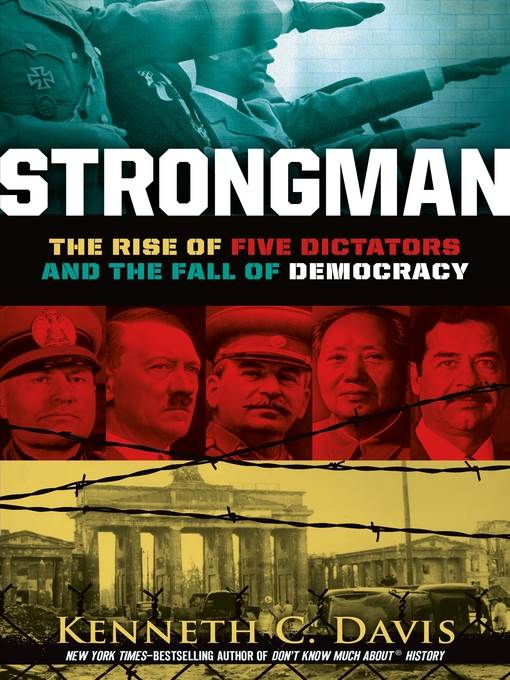
Strongman
The Rise of Five Dictators and the Fall of Democracy
کتاب های مرتبط
- اطلاعات
- نقد و بررسی
- دیدگاه کاربران
نقد و بررسی

Starred review from August 15, 2020
History's warnings reverberate in this gripping read about five dictatorial strongmen. This complex yet accessible title examines the lives and deeds of Benito Mussolini, Adolf Hitler, Joseph Stalin, Mao Zedong, and Saddam Hussein. This is no dry textbook; rather, the author presents deep personal and historical context with an eye toward explaining depravity. By reading these accounts, readers come to better understand how such rulers rise to power--and how we might act to avoid future evils. This book does not minimize atrocities or humanize tyrants, nor does it shy away from uncomfortable questions about ordinary citizens' complicity. Instead readers are asked to ponder how contemporary democracies actually create the conditions for such individuals to come to power. The chilling final chapter asks, "Never Again?" as Davis emphasizes the need for vigilance as the democratic protections many contemporary citizens of democratic nations embrace are not inviolable. Timeline graphics put the individual cases into larger historical context, and key terms are explained in sophisticated depth. The author draws from an extensive lineup of thinkers and writers, from Primo Levi, Thucydides, Madeleine Albright, and Lord Acton to George Orwell and more. The book concludes with an impressive bibliography and endnotes. This powerful overview, enhanced with photographs, hinges on the idea that autocratic power is only possible with the complicity of ordinary others and that those who resist are the rare heroes of a terrifyingly timely story. A pitch-perfect balance of nuanced reflection and dire warning. (Nonfiction. 12-18)
COPYRIGHT(2020) Kirkus Reviews, ALL RIGHTS RESERVED.

September 1, 2020
Grades 7-12 At a time when dictators are rampant in such countries as North Korea, Turkey, China, Russia, and others, Davis' deep dive into the lives of five of history's most notorious dictators (or strongmen as he calls them)?Mussolini, Hitler, Stalin, Mao, and Hussein?is apposite and timely. Readers learn that each of the five was unspeakably vile in his own way, but together they did share areas of commonality: all of them developed a cult of personality, all of them created new generations of loyal young people (Hitler youth, for example), placed blame on a single group (as Hitler did with the Jews), called for "law and order," took control of the media, etc. Davis does not sugarcoat his material, inviting long thoughts with his assertion that this is a decidedly human story that points to real people as evidence that evil exists in this troubled world. The philosopher Santayana famously said, Those who do not learn history are doomed to repeat it. Happily, Davis offers his readers a salutary opportunity to learn.(Reprinted with permission of Booklist, copyright 2020, American Library Association.)

November 1, 2020
Gr 9 Up-Davis profiles five ruthless dictators: Adolf Hitler, Benito Mussolini, Joseph Stalin, Mao Zedong, and Saddam Hussein. Three of the book's eight chapters discuss democracy and other forms of government, the times in which the dictators lived, other "strongmen," and the need for vigilance against authoritarianism. Each biographical chapter features a time line of the dictator's life and quotes by or about the man and his regime. Davis deftly opens these chapters with a narrative about the subject, followed by a chronological account of his life. The time line and quotes give readers a sense of both the historical context and the character of the profiled person. Davis describes the brutality inflicted by the dictators but, aside from the chapter on Hussein, most of the descriptions are not graphic. The text also explains the role that the Western powers had in allowing these men to gain dominance. The abuses committed by the United States, as in the case of the Abu Ghraib prison scandal, are also mentioned. The prose can be dry at times, and there are a few instances where the historical context is not explained well. Relevant black-and-white photographs, which are credited and captioned, maintain readers' interest. An extensive bibliography, which contains adult and young adult titles, and endnotes support further research. VERDICT A title that satisfies research and general interest needs, and one that libraries serving high schoolers will want to have.-Hilary Writt, formerly at Sullivan Univ., Lexington, KY
Copyright 2020 School Library Journal, LLC Used with permission.

Starred review from November 9, 2020
This captivating history of five depraved “strongmen” offers a timely warning about the need to protect democracy. Davis (In the Shadow of Liberty) provides absorbing, clearly distilled biographies of Adolf Hitler, Saddam Hussein, Mao Zedong, Benito Mussolini, and Joseph Stalin, as well as profiles of their respective dictatorships and atrocities. Pithy prose effectively dramatizes catalyzing events, such as how Hitler exploited a fire in the German government headquarters of the Reichstag in 1933 to seize absolute power for the Nazis. A concise history of democracy from Athens to the American Revolution describes its inherent fragility and helps contextualize the tyranny of each of these authoritarians. While documenting these distinct men and their political realities, Davis skillfully defines what the dictators and their regimes share, as in the targeting and indoctrinating of youth, reified in Stalin’s Young Pioneers and Hussein’s Lion Cubs. Powerful black-and-white photographs further underscore the events, and a complex concluding chapter titled “Never Again?” wrestles with how history repeats itself, challenging readers to preserve democratic freedoms. A fascinating, highly readable portrayal of infamous men that provides urgent lessons for democracy now. Ages 12–18.

























دیدگاه کاربران